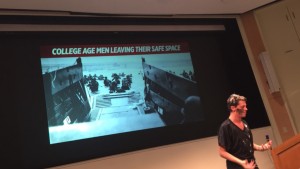In his 1961 Farewell Address, President Dwight D. Eisenhower issued a solemn warning, stating that “This world of ours… must avoid becoming a community of dreadful fear and hate, and be, instead, a proud confederation of mutual trust and respect.” With the subsequent ascension of President John F. Kennedy, the nation spiraled into even further turmoil as the Cold War heightened and the civil rights movement came to a head. As the times gradually changed through the second half of the twentieth century, so too did the attitudes of partisanship within the United States: namely, they settled down. Again, however, the times change. In a trend that has only gotten worse since the fateful day of September 11, what began as constructive divergence and disagreement has devolved into outright hatred, disrespect, and radicalization. Nowhere is this schism so deeply-rooted than on the American college campus.
Dartmouth’s experiences with this phenomenon are well-known and oft-cited. In more recent years, publications such as the aptly-named Dartmouth Radical (and, increasingly, The Dartmouth), organizations such as the ever-ambiguous OPAL, and administrators like the well-meaning but woefully misguided Inge-Lise Ameer have done nothing but plunge this campus into deeper discord and division. The radical ideas of the Freedom Budget (and their egregiously disrespectful deliverance) represented the ideas of only a fringe group of students on campus, yet somehow managed to gain traction in the greater student body and manifestation in the administration’s policies. The infamous Black Lives Matter protest in Baker-Berry Library and vandalization of a National Police Week bulletin board incited nationwide scandal and national coverage. The list continues, and so does the devaluation of a Dartmouth degree as a result.
Of course, this phenomenon is not limited to just the College on the Hill; it applies to nearly every single institution of higher education from the Atlantic to the Pacific, and even beyond our borders. As I have previously described, “The brute ideological force of the left has supplanted even moderate reason and replaced it with inflammatory rhetoric, pushing tensions amongst students to, at times, violent levels.” Countless protests have taken place at universities across America, many incited by the visit of controversial journalist Milo Yiannapoulos, who visited Dartmouth in November of 2016. Yale University was struck by similar scandal earlier what year, when a professor was accosted by students after sending out a general email regarding Halloween costumes – an action which, by any reasonable person, could hardly be considered controversial. In an unsurprisingly similar vein, the election of President Donald J. Trump resulted in (obviously fruitless) protests and riots across the world. More recently, noted scholar and sociologist Charles Murray was received at Middlebury by violent riots, which resulted in the hospitalization of a faculty member for injuries received by protesting students. When all the incidents are looked at together, the overall picture they paint can only be described as grim.
There is, however, a silver lining. It seems as though the students of the College have, in a way, wised up, abandoning more theatric displays in favor of more simple, civil demonstration or, better yet, keeping their mouths shut. Charles Murray made his way to Hanover in April of 2016, and the event went off without a hitch. The Milo Yiannapoulos event in November was, surprisingly, met with little to no reaction from campus liberal contingents. While President Trump’s election was met with protest, the demonstrations were less provocative and more solemn. These reactions – or lack thereof – stand in stark contrast to the antics of Dartmouth’s radical left in the past. The Freedom Budget and infiltration of President Hanlon’s private office, alleged violence at the infamous Black Lives Matter library protest, and the downright silly Derby and Pigstick protests seem like ancient history to students of today. Their unfortunate effects, however, are still felt by each and every student, male or female, freshman or senior, liberal or conservative.
The breaking point, however, has already been passed; as the general atmosphere has calmed down, the wounds have likewise begun to heal. It is imperative that we allow them to do so, lest we plunge the brothers and sisters of this College into turmoil once again. On Wednesday, April 12, the College Republicans and College Democrats will engage in a public debate – the first of its kind in years. It is steps like these that make the future of intellectual discourse and at this institution look brighter. Our mutual respect for one another, even in times of conflicting ideas, is of the utmost importance; if we do not retain it, it will be our ultimate destruction.


Be the first to comment on "Our Mutual Respect"